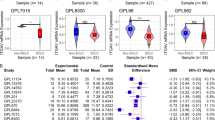Abstract
Background
Integrin-linked kinase (ILK) is an intracellular signaling protein critically involved in cellular growth and motility. In non-small cell lung cancer (NSCLC), increased ILK expression has been associated with decreased recurrence-free and overall survival. Recently, ILK has also been detected in the serum of NSCLC patients.
Objective
To assess the prognostic impact of preoperative serum ILK (sILK) concentration on overall survival in surgically amenable NSCLC.
Patients and methods
Preoperative sILK was quantified by ELISA in 50 newly diagnosed NSCLC patients. After surgery, patients were followed-up for a median interval of 2.5 years.
Results
Serum ILK concentrations ranged from 0 to 2.44 ng/ml. Mean sILK was around 2.3 times higher in the 16 patients who died as compared to the 34 patients who survived (1.04 vs. 0.45 ng/ml, p = 0.001). In univariate time-to-event analysis, increased sILK was associated with adverse survival [Hazard ratio (HR): 4.03, 95 % CI: 2.00–8.13, p < 0.001]. This association prevailed after multivariable adjustment for several clinical, demographic, and laboratory parameters (HR: 3.85, 95 % CI: 1.53–9.72, p = 0.004).
Conclusions
Serum ILK shows potential as a novel strong and independent prognostic marker for postoperative survival in surgically amenable NSCLC.




Similar content being viewed by others
References
Jemal A, Bray F, Center MM, Ferlay J, Ward E, Forman D. Global cancer statistics. CA Cancer J Clin. 2011;61(2):69–90.
(ONS) OoNS. Cancer survival in england: patients diagnosed 2005–2009 followed up to 2010. ONS Stat Bull. 2011.
Baldwin DR, White B, Schmidt-Hansen M, Champion AR, Melder AM. Diagnosis and treatment of lung cancer: summary of updated NICE guidance. BMJ. 2011;342:d2110.
Hannigan G, Troussard AA, Dedhar S. Integrin-linked kinase: a cancer therapeutic target unique among its ILK. Nat Rev Cancer. 2005;5(1):51–63.
Watzka SB, Setinek U, Huber M, Cantonati H, Lax F, Watson S, et al. Reactivity of integrin-linked kinase in human mesothelial cell proliferation. Interact Cardiovasc Thorac Surg. 2008;7(1):107–10.
Watzka SB, Setinek U, Stubenberger EB, Totsch M, Dekan G, Marcher M, et al. Integrin-linked kinase, phosphorylated AKT and the prognosis of malignant pleural mesothelioma. Eur J Cardiothorac Surg. 2011;39(2):180–4.
Okamura M, Yamaji S, Nagashima Y, Nishikawa M, Yoshimoto N, Kido Y, et al. Prognostic value of integrin beta1-ILK-pAkt signaling pathway in non-small cell lung cancer. Hum Pathol. 2007;38(7):1081–91.
Takanami I. Increased expression of integrin-linked kinase is associated with shorter survival in non-small cell lung cancer. BMC Cancer. 2005;5(5):1.
Ahmed N, Riley C, Oliva K, Stutt E, Rice GE, Quinn MA. Integrin-linked kinase expression increases with ovarian tumour grade and is sustained by peritoneal tumour fluid. J Pathol. 2003;201(2):229–37.
Ito R, Oue N, Zhu X, Yoshida K, Nakayama H, Yokozaki H, et al. Expression of integrin-linked kinase is closely correlated with invasion and metastasis of gastric carcinoma. Virchows Arch. 2003;442(2):118–23.
Li R, Liu B, Yin H, Sun W, Yin J, Su Q. Overexpression of integrin-linked kinase (ILK) is associated with tumor progression and an unfavorable prognosis in patients with colorectal cancer. J Mol Histol. 2013;44(2):183–9.
Watzka SB, Posch F, Pass HI, Huflejt M, Bernhard D, Hannigan GE, et al. Detection of integrin-linked kinase in the serum of patients with malignant pleural mesothelioma. J Thorac Cardiovasc Surg. 2011;142(2):384–9.
Janes H, Longton G, Pepe M. Accommodating covariates in ROC analysis. Stata J. 2009;9(1):17–39.
McShane LM, Altman DG, Sauerbrei W, Taube SE, Gion M, Clark GM. REporting recommendations for tumour MARKer prognostic studies (REMARK). Eur J Cancer. 2005;41(12):1690–6.
Altman DG, McShane LM, Sauerbrei W, Taube SE. Reporting recommendations for tumor marker prognostic studies (REMARK): explanation and elaboration. BMC Med. 2012;10:51.
Watzka SB, Rauscher-Potsch I, Stubenberger E, Getman V, Setinek U, Totsch M, et al. Immunoreactivity of integrin-linked kinase in primary non-small-cell lung cancer and survival after curative resection. Eur J Cardiothorac Surg. 2010;38(3):254–9.
McDonald PC, Fielding AB, Dedhar S. Integrin-linked kinase–essential roles in physiology and cancer biology. J Cell Sci. 2008;121(Pt 19):3121–32.
Durbin AD, Hannigan GE, Malkin D. Oncogenic ILK, tumor suppression and all that JNK. Cell Cycle. 2009;8(24):4060–6.
Ahmed N, Oliva K, Rice GE, Quinn MA. Cell-free 59 kDa immunoreactive integrin-linked kinase: a novel marker for ovarian carcinoma. Clin Cancer Res. 2004;10(7):2415–20.
Watzka SB, Posch F, Pass HI, Flores RM, Hannigan GE, Bernhard D, et al. Serum concentration of integrin-linked kinase in malignant pleural mesothelioma and after asbestos exposure. Eur J Cardiothorac Surg. 2013;43(5):940–5.
Hegmans JP, Bard MP, Hemmes A, Luider TM, Kleijmeer MJ, Prins JB, et al. Proteomic analysis of exosomes secreted by human mesothelioma cells. Am J Pathol. 2004;164(5):1807–15.
Thery C, Zitvogel L, Amigorena S. Exosomes: composition, biogenesis and function. Nat Rev Immunol. 2002;2(8):569–79.
Brundage MD, Davies D, Mackillop WJ. Prognostic factors in non-small cell lung cancer: a decade of progress. Chest. 2002;122(3):1037–57.
Acknowledgments
This study was funded by an unrestricted grant of the Karl Landsteiner Institute for Thoracic Oncology (Sanatoriumstrasse 2, 1140 Vienna, Austria, www.karl-landsteiner.at/institute/thorokale_onkologie.html). The authors would like to thank the study patients for their participation and support.
Conflict of interest
The authors have no conflicting interests to declare.
Author information
Authors and Affiliations
Corresponding author
Rights and permissions
About this article
Cite this article
Posch, F., Setinek, U., Flores, R.M. et al. Serum integrin-linked kinase (sILK) concentration and survival in non-small cell lung cancer: a pilot study. Clin Transl Oncol 16, 455–462 (2014). https://doi.org/10.1007/s12094-013-1101-6
Received:
Accepted:
Published:
Issue Date:
DOI: https://doi.org/10.1007/s12094-013-1101-6




